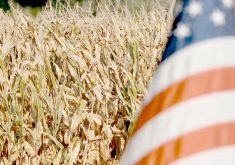Jim Cornelius was beaming last week as the federal government announced a new $62 million fund to boost the production of farmers in poor countries.
Helping small farmers produce yields closer to Canadian levels is what prairie farmers want the government to do to match their commitment to helping alleviate hunger overseas, the executive director of the Canadian Foodgrains Bank said following the announcement of the fund by federal international co-operation minister Beverley Oda.
“We very much welcome the focus on smallholder agriculture,” he said.
Read Also

Farmers urged to be grain-safe this fall
Working around grain bins comes with risk, from farmers falling to drowning in grain: Experts have five tips to help avoid grain-related accidents this harvest.
“Most of the food production (in developing countries) is produced by smallholders. Most of the poor are smallholders. We can strengthen both their livelihoods and food production at the same time.”
Increasing production
The Canadian International Food Security research fund (CIFS) will support collaborative research projects between Canadian and developing nation scientists and focus on improving farm production.
Researchers will work on crop varieties that can withstand heat and droughts, produce more nutritious food and ward off crippling crop diseases such as rust.
Oda said the research is intended to produce “practical and concrete solutions to challenges on the ground in the developing country.”
Canadian experts can help overseas researchers because they have tackled similar challenges, she added.
“Our Canadian expertise and knowledge in dryland farming and rehabilitation, the reduction of post-harvest losses and animal vaccines will be especially valuable for developing countries,” she said.
“With the CIFS research fund, our goal is to see results that are accessible to smallholder farmers, particularly in Africa and Asia, the majority of whom are women.”
Cornelius praised the Canadian government’s 2008 decision to untie food aid from requirements to buy Canadian-grown crops.
He said allowing Canadians to donate crops and money to the foodgrains bank and other organizations without compelling them to ship that exact grain overseas allows aid to be delivered more effectively and cheaply and doesn’t undercut local farmers and discourage them from investing in their own farms.
“Now we have flexibility,” said United Nations World Food Program policy head David Stevenson.
“We’re able to buy food closer and more efficiently when it’s available. We’re also buying food in Canada when it is the most reliable and cost effective source.”















